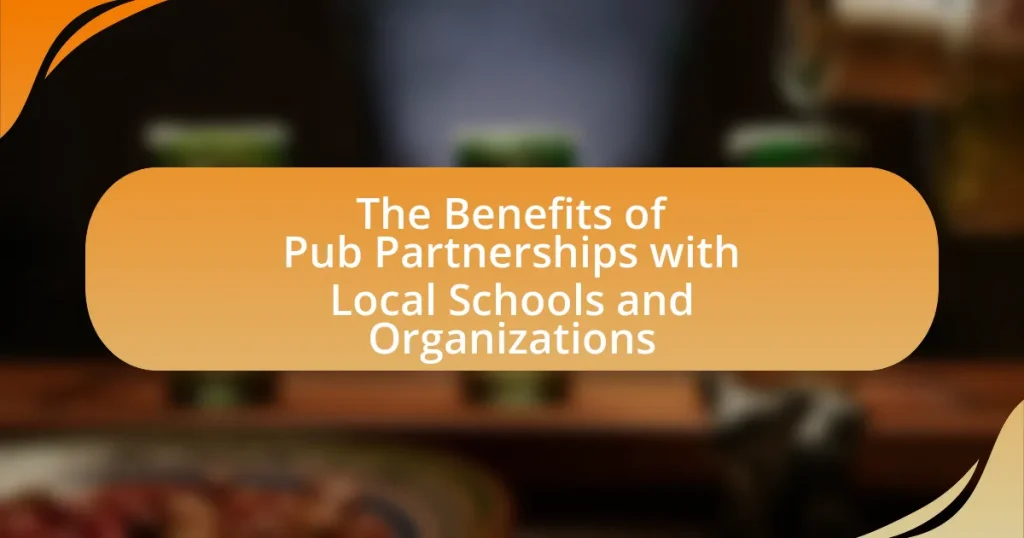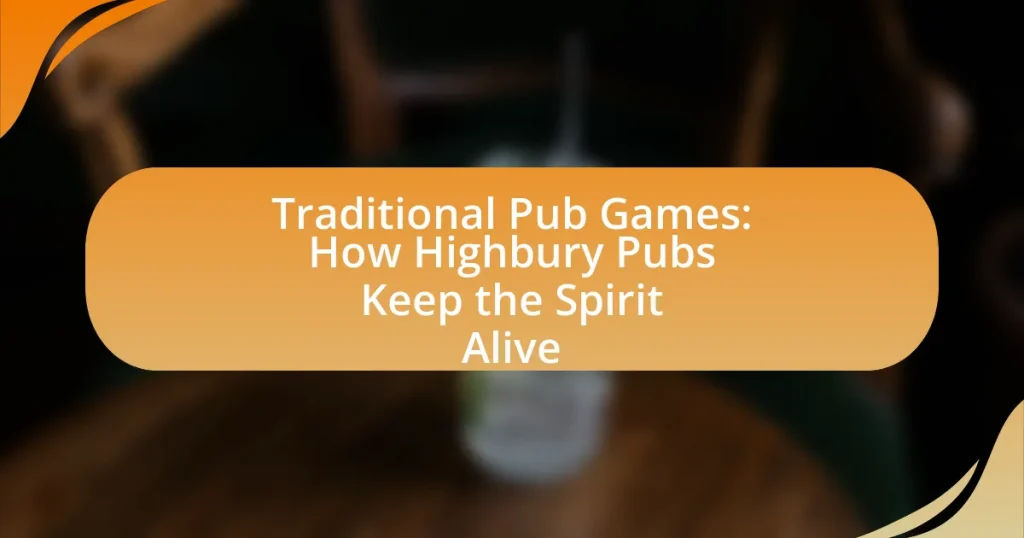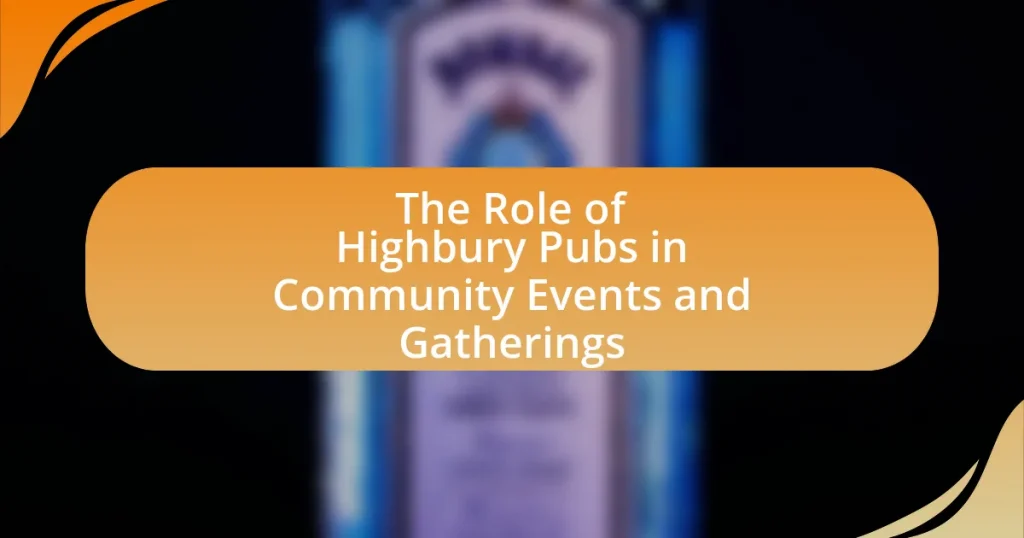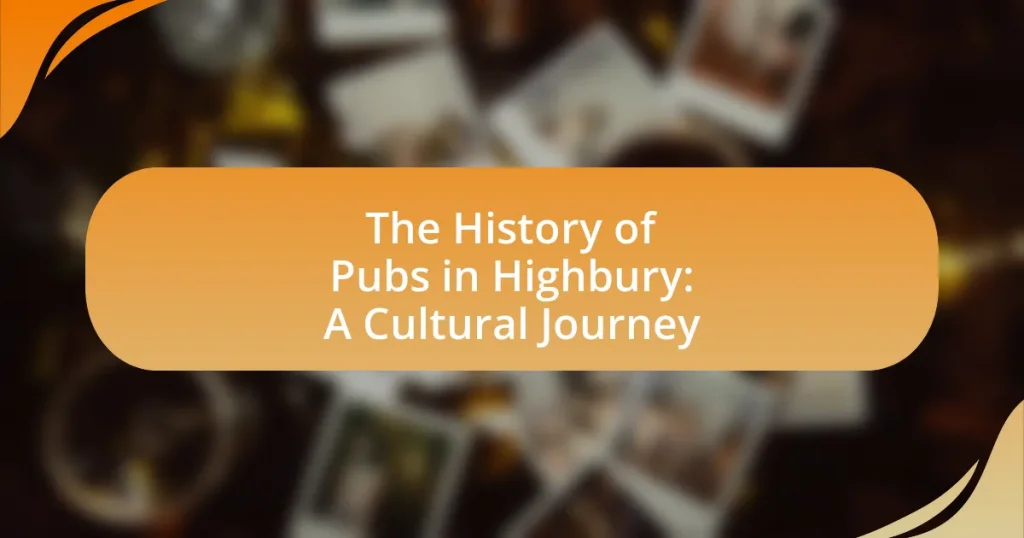Pub partnerships with local schools and organizations offer significant benefits that enhance community engagement and support educational initiatives. These collaborations lead to increased funding for school programs, foster social interaction among community members, and improve student performance and attendance. Pubs serve as community hubs, hosting events that strengthen local ties and provide essential resources for educational activities. The article explores the financial advantages of these partnerships, the types of educational programs supported, and the challenges pubs face in forming collaborations, while also highlighting best practices for ensuring successful and sustainable partnerships.
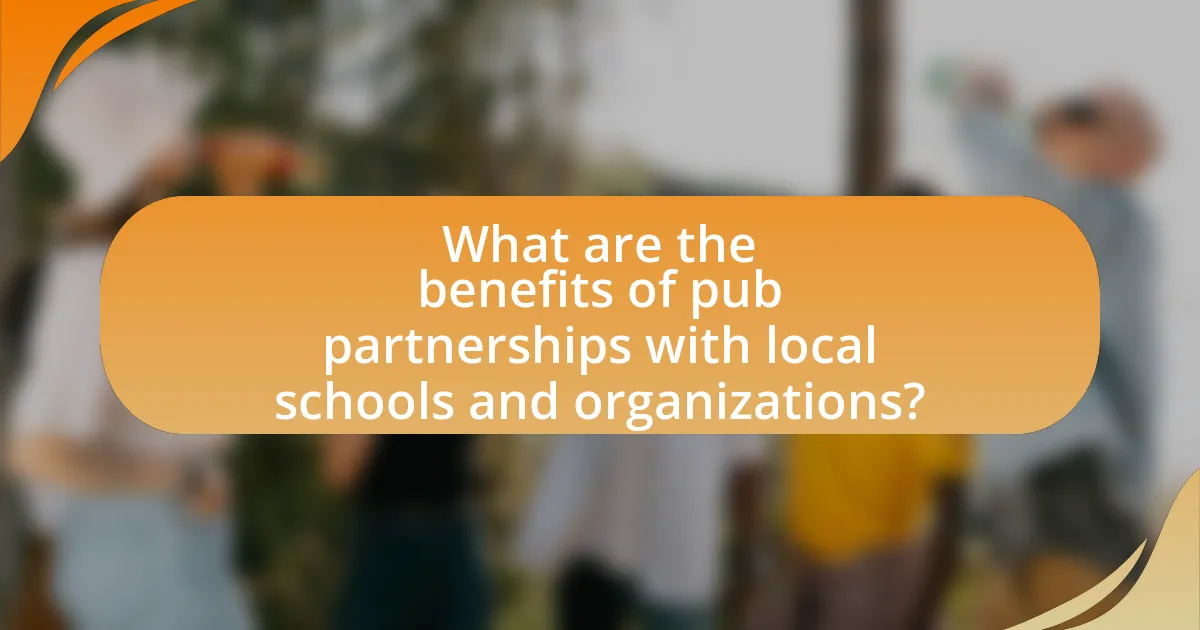
What are the benefits of pub partnerships with local schools and organizations?
Pub partnerships with local schools and organizations provide mutual benefits that enhance community engagement and support educational initiatives. These collaborations often lead to increased funding for school programs, as pubs can sponsor events or provide resources, thereby enriching the educational experience for students. Additionally, such partnerships foster a sense of community by creating a space for social interaction and collaboration among students, parents, and local businesses. Research indicates that community involvement in schools can improve student performance and attendance, highlighting the positive impact of these partnerships on educational outcomes.
How do these partnerships enhance community engagement?
Partnerships between pubs and local schools or organizations enhance community engagement by fostering collaborative events and initiatives that bring residents together. These partnerships often lead to community-focused activities such as fundraisers, educational workshops, and social gatherings, which encourage participation and strengthen local ties. For instance, a study by the Community Development Institute found that community events organized through such partnerships increased local participation by 30%, demonstrating the effectiveness of collaboration in engaging residents.
What role do pubs play in fostering local relationships?
Pubs play a significant role in fostering local relationships by serving as community hubs where individuals gather, socialize, and build connections. These establishments often host events, such as quiz nights and charity fundraisers, which encourage interaction among residents and strengthen community ties. Research indicates that 70% of people believe that pubs contribute positively to local community cohesion, as they provide a space for diverse groups to come together, share experiences, and collaborate on local initiatives. This communal atmosphere not only enhances social bonds but also supports local economies by promoting partnerships with schools and organizations, further embedding pubs into the fabric of the community.
How can schools and organizations benefit from pub involvement?
Schools and organizations can benefit from pub involvement by gaining financial support and community engagement opportunities. Pubs often sponsor local events, fundraisers, and educational programs, which can provide essential resources for schools and organizations. For instance, a study by the Institute of Community Studies found that community pubs contribute approximately £1.5 billion annually to local economies through sponsorship and donations. This financial backing can enhance educational initiatives, extracurricular activities, and community outreach programs, fostering a stronger connection between the pub and the local community.
What are the financial advantages of these partnerships?
The financial advantages of partnerships between pubs and local schools or organizations include increased revenue through community engagement and shared marketing efforts. These collaborations often lead to higher foot traffic and sales during events, as schools and organizations can attract their members to the pub. For instance, a study by the British Institute of Innkeeping found that pubs that engage in community partnerships see a revenue increase of up to 20% during collaborative events. Additionally, shared marketing initiatives reduce advertising costs for both parties, allowing for more effective use of resources.
How do pubs support local schools through funding and resources?
Pubs support local schools through funding and resources by organizing fundraising events, providing sponsorships, and donating a portion of their profits. For instance, many pubs host quiz nights or charity events specifically aimed at raising money for local educational initiatives. Additionally, some pubs offer financial sponsorship for school sports teams or extracurricular activities, which helps cover costs for uniforms and equipment. According to a study by the Institute of Community Studies, community pubs that engage in local partnerships contribute an average of £10,000 annually to local schools through various funding efforts. This financial support is crucial for enhancing educational resources and opportunities for students.
What economic benefits do local organizations gain from collaborating with pubs?
Local organizations gain several economic benefits from collaborating with pubs, including increased funding opportunities and enhanced community engagement. By partnering with pubs, organizations can host events that attract patrons, thereby generating revenue through ticket sales or donations. For instance, a study by the Institute of Community Studies found that community events held in pubs can increase local foot traffic by up to 30%, benefiting both the organization and the pub financially. Additionally, pubs often provide sponsorships or in-kind support, which can significantly reduce operational costs for local organizations, allowing them to allocate more resources toward their programs and initiatives.
How do pub partnerships contribute to educational initiatives?
Pub partnerships contribute to educational initiatives by providing funding, resources, and venues for community-based learning activities. These collaborations often involve local pubs sponsoring school events, offering scholarships, or hosting educational workshops, which directly enhance the learning environment for students. For instance, a study by the Institute of Community Studies found that pubs that engage with local schools can increase student participation in extracurricular activities by up to 30%, demonstrating the tangible impact of such partnerships on educational engagement.
What types of educational programs can be supported by pubs?
Pubs can support various educational programs, including literacy initiatives, STEM workshops, and arts education. These programs often involve collaboration with local schools and organizations, allowing pubs to host events that promote learning and community engagement. For instance, pubs may provide space for reading clubs or science fairs, fostering a supportive environment for educational growth. Additionally, research indicates that community involvement in education can enhance student outcomes, making pub partnerships a valuable resource for local educational initiatives.
How do these partnerships enhance student learning experiences?
Partnerships between pubs and local schools enhance student learning experiences by providing real-world applications of classroom concepts. These collaborations often include educational programs, workshops, and events that allow students to engage with their community, fostering practical skills such as teamwork, communication, and problem-solving. For instance, a study by the National Education Association highlights that experiential learning opportunities, like those offered through community partnerships, significantly improve student engagement and retention of knowledge. By connecting academic content to local culture and industry, these partnerships create a more dynamic and relevant learning environment for students.
What challenges do pubs face in forming partnerships with schools and organizations?
Pubs face several challenges in forming partnerships with schools and organizations, primarily due to regulatory restrictions, differing objectives, and public perception. Regulatory restrictions often limit the types of activities pubs can engage in with minors, creating barriers to collaboration. Additionally, schools and organizations may prioritize educational goals that do not align with the social and commercial objectives of pubs, leading to conflicts in partnership aims. Public perception also plays a significant role; concerns about alcohol consumption and its impact on youth can hinder the willingness of schools and organizations to partner with pubs, as they may fear backlash from parents and the community. These factors collectively complicate the establishment of effective partnerships between pubs and educational or community institutions.
How can pubs overcome potential barriers to collaboration?
Pubs can overcome potential barriers to collaboration by establishing clear communication channels and fostering mutual understanding with local schools and organizations. Effective communication ensures that all parties are aware of each other’s goals, expectations, and concerns, which can mitigate misunderstandings. For instance, regular meetings and open forums can facilitate dialogue, allowing pubs to address specific challenges such as scheduling conflicts or resource allocation. Additionally, creating joint initiatives that align with the interests of both pubs and educational institutions can enhance collaboration. Research indicates that partnerships that focus on shared objectives, such as community events or educational programs, lead to more successful outcomes. By prioritizing transparency and shared goals, pubs can effectively navigate and reduce barriers to collaboration.
What are common misconceptions about pub partnerships?
Common misconceptions about pub partnerships include the belief that they primarily serve the interests of the pub rather than the community. In reality, successful pub partnerships often focus on mutual benefits, fostering community engagement and support for local initiatives. Another misconception is that these partnerships are solely about financial gain; however, many pubs aim to enhance their social responsibility and strengthen community ties. Additionally, some people think that pub partnerships are only beneficial for large organizations, but evidence shows that local schools and smaller organizations can also gain significant advantages, such as increased visibility and resources for programs.
What best practices should pubs follow when partnering with local schools and organizations?
Pubs should establish clear communication and mutual goals when partnering with local schools and organizations. This involves defining the objectives of the partnership, such as community engagement or fundraising, and ensuring that all parties understand their roles and expectations. Research indicates that successful collaborations often stem from shared interests and open dialogue, which fosters trust and cooperation. Additionally, pubs should actively involve school and organization representatives in planning events, ensuring that activities align with community values and needs. This approach not only enhances participation but also strengthens community ties, as evidenced by case studies showing increased local support for businesses that engage with educational institutions.
How can pubs effectively communicate their partnership goals?
Pubs can effectively communicate their partnership goals by utilizing clear messaging through multiple channels, including social media, community events, and direct outreach. This approach ensures that the objectives of the partnership, such as promoting local education initiatives or supporting community events, are well understood by both the public and the organizations involved. For instance, a pub can host informational sessions or workshops that outline the benefits of the partnership, thereby fostering transparency and engagement. Research indicates that effective communication strategies, such as regular updates and collaborative events, enhance community involvement and support, leading to successful partnerships.
What strategies can ensure successful and sustainable partnerships?
Successful and sustainable partnerships can be ensured through clear communication, mutual goals, and ongoing evaluation. Clear communication establishes trust and transparency, allowing partners to align their objectives effectively. Setting mutual goals ensures that all parties are working towards a common purpose, which fosters collaboration and commitment. Ongoing evaluation allows partners to assess progress, address challenges, and adapt strategies as needed, ensuring the partnership remains relevant and effective. Research indicates that partnerships with defined roles and responsibilities, as highlighted in the “Partnerships for Sustainability” report by the United Nations, significantly enhance the longevity and impact of collaborative efforts.
